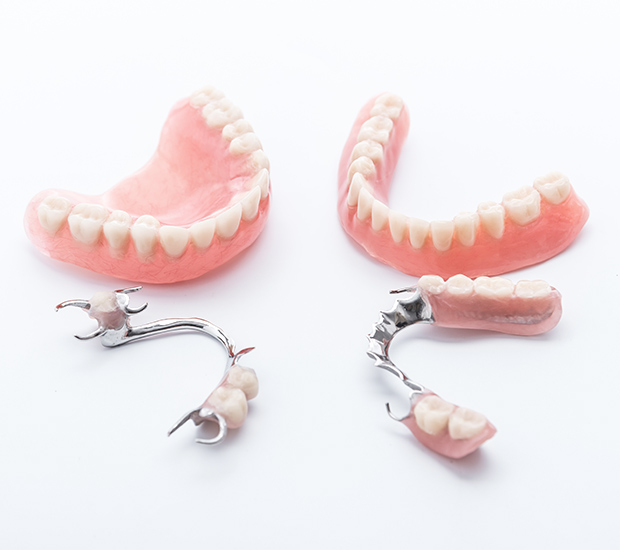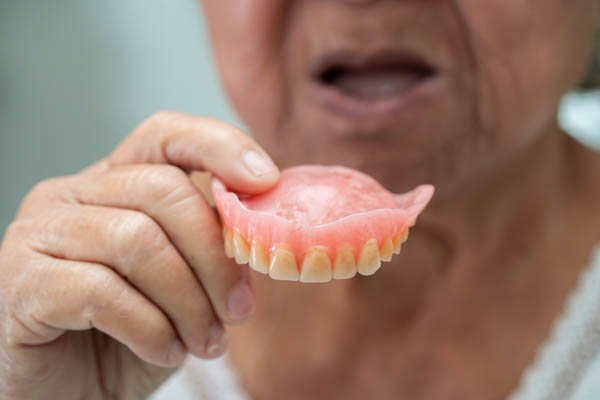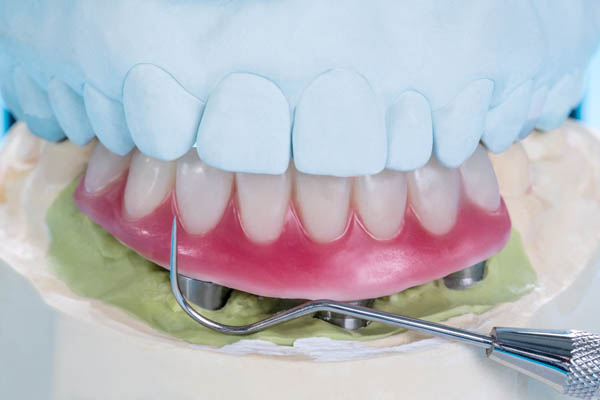Dentures and Partial Dentures Houston, TX
You have probably heard about partial and full dentures as treatments for tooth loss. If you are now facing this problem and want to do something about your smile, these are great solutions. Living with missing teeth can make things difficult for eating, but it can also affect your self-esteem. Dentures and partial dentures are practical solutions to restore mouth function and help patients enjoy smiling once again.
Dentures and partial dentures are available at Jeff Tollett, DDS in Houston and the surrounding area. Our staff can evaluate your condition and determine which option is the right fit for you. Whether you are missing a few teeth, several teeth, or all your teeth, dentures may provide the relief you have been anticipating. Because our professionals have the necessary knowledge and training, you can feel at ease knowing we can set you on the path to a beautiful smile.
Call our office today at (713) 481-3045 so you can make an appointment.
Benefits of Getting Dentures
It is normal for people to be nervous about getting dentures and partial dentures. Replacing teeth is an essential step in a person's journey to achieve the oral health they want. Dentures are natural-looking. When in place, dentures do not look awkward or clunky. Dentures have strong artificial teeth and allow patients to eat many of their favorite foods. Also, this treatment can last for ten years or more, depending on how well the patient will take care of the dentures.
According to WebMD, wearing dentures can improve a person's smile. No longer does the patient have to hide a toothless smile but can instead open up without feeling embarrassed or ashamed. Showing off one's smile can make it more comfortable to meet new people, speak in public, socialize, and get back activities they once did. Dentures will typically not cost as much as some other treatments. Some insurance plans may even cover some of the costs. If your considering dentures, talk with your insurance provider to see what parts of the cost are covered.
Check out what others are saying about our denture and partial denture services on Yelp: Dentures and Partial Dentures Houston
Importance of Replacing Teeth
Since the teeth play a crucial role in multiple aspects of one's life, it is essential to keep up one's oral health routine. If one tooth has an infection, then there is a chance of it spreading to other teeth and the jaw. Plaque that remains on the teeth long enough can cause decay and lead to tooth loss. Fortunately, we can use dentures and partial dentures to restore a smile and boost oral health.
Along with functioning in the same way teeth do and providing the appearance of a natural smile, dentures can replace damaged teeth that cause the patient pain. While the patient can take necessary steps to prevent tooth loss, oral hygiene may not be enough once the infection reaches a more severe stage. In other cases, patients may have a gap or several gaps due to missing teeth.
Once permanent adult teeth fall out, there is no way to grow new ones. Thankfully, we can use dentures or partial dentures to replace them. Dentures will replace an entire row of teeth along the upper or lower jaw, while partial dentures can replace several teeth or half of a row of teeth.
Dentures vs. Partial Dentures
As discussed in an article by the Oral Health Foundation, there are differences between full and partial dentures. Full dentures are a good option for patients who have no remaining teeth, or whose damaged teeth are beyond repair or salvaging.
Meanwhile, a partial appliance makes sense when the person still has some natural teeth remaining. At Jeff Tollett, DDS, we can fit patients with either one of these mouth appliances.
Permanent Dentures
There are forms of permanent dentures as well, though these may not be as common as the removable type. Permanent dentures can be more secure and durable. With permanent dentures, we anchor this apparatus to the jaw with implants. People choose these dentures to help avoid the embarrassment of the appliance slipping out while speaking or eating.
Deciding If Dentures Are Right for You
Living without teeth can be difficult, both physically and emotionally. People who are missing teeth recognize the need to replace them but may not know which option is right. Patients should speak with our staff about dentures and partial dentures, along with other possibilities.
We can help patients who are researching the pros and cons of each tooth replacement option. If there are any concerns or questions about dentures, patients can ask our staff.
How Dentures Work
The doctor should speak openly to their patients about dentures and partial dentures. Patients need to understand the benefits and possible drawbacks of this treatment. Unlike implants and bridges, dentures are removable. This apparatus consists of a gum-colored acrylic base and artificial teeth.
The teeth usually consist of metal, covered in plastic. The patient will fit the dentures over the gums. Denture adhesive products are available to help keep the appliance firmly in place in the mouth. After a few days to adjust, the patient should not experience discomfort or irritation when wearing the dentures. If pain persists, contact your dentist.
The Process of Getting Dentures
Our dentist will first meet with the patient to discuss the treatment and what to expect. Team members will take X-rays and make impressions of the patient’s mouth. These will go to a lab technician who can customize the appliance for the patient. At this first appointment, our dentist may remove any decayed or severely damaged teeth. If necessary, this may occur at a subsequent appointment.
Once the dentures are ready, the patient will return to Jeff Tollett, DDS for the fitting process. This appointment will also happen after the gums have healed following any tooth extractions. In making sure the dentures fit correctly, we will also make any adjustments when necessary. Once complete, the patient will be able to bite down without issue.
Follow-Up Care
All types of medical and dental procedures have potential side effects. Fortunately, getting dentures is less risky than other tooth-replacement options. It can take some time for the wearer to adjust to having dentures in the mouth. After several days, the wearer should feel comfortable. There may also be some minor pain, soreness, and irritation in the gums. Patients should contact our office right away if these problems persist.
It is still essential for patients to visit our office for regular dental appointments, even after getting dentures. Our dentist will examine the patient’s gums and will also make sure the dentures still fit well and are functioning correctly. Once the appliance starts to wear out, we can make a new one for the patient.
Other Tooth Replacement Options
In addition to dentures and partial dentures, patients may want to consider other ways to replace missing teeth. When deciding which option to choose, there are a few factors to consider, such as cost, general dental health, and your lifestyle.
While implants are most likely to create the feeling of having a natural set of teeth, they are not always a feasible option. Cost is a top concern, especially when many or all teeth need replacement. According to WebMD, gum and bone health is important for successful implants.
Another option is an implant- or tooth-supported fixed bridge. This works similarly to the implant-supported denture but is not removable. Instead of clipping on to the teeth or implants, however, the bridge is affixed with cement or a screw. In addition to costing more than dentures, this option does not work with all configurations of missing teeth.
In the case of missing front teeth, dentists sometimes recommend a resin-bonded bridge. It is not very durable, which is why it is not used to replace other types of teeth that typically take more strain when chewing. It consists of a tooth replacement held on two wings that attach to the insides of the natural teeth on either side.
Care and Maintenance of the Dentures
Though dentures are durable and help the patient once again bite into food, these appliances can break. Dentures can also warp or get dirty, so it is vital that people follow proper maintenance guidelines, as described in this article on the American Dental Association website. Our team at Jeff Tollett, DDS will counsel each patient on proper care to extend the life of their dentures. Though, ultimately, it is up to the patient to be diligent in routine care and contacting the dentist when problems arise.
After eating a meal, a patient should remove their dentures and rinse the appliance thoroughly with water, removing excess food. Also, patients should brush the dentures with a soft toothbrush and non-abrasive toothpaste. When it is time to retire for the night, the person should remove the dentures. Some denture wearers soak their dentures in a solution. You may contact our team to see if a denture solution is recommended for your care routine.
What to Do in Case of Breakage
There are plenty of ways to repair your dentures in the event of an accident. It is almost inevitable that patients will find a crack or break in the appliance at some point. The base could crack, or a tooth could break loose. For a quick fix, there are products available online and at most local grocery stores and pharmacies, such as D.O.C.® Repair-It®, Cushion Grip®, and Perk ®'s Denture Repair Kit. If you are considering using a product for a temporary fix, please contact your dental office first. Whenever significant damage occurs, like a large crack across the base, you should seek medical treatment.
In any case of breakage, the denture-wearer should contact our office right away. Our team has the right tools and equipment to fix the dentures properly. Patients can feel good that our dental professionals will carefully examine the damage and repair it. If necessary, the dentist may have to replace the dentures altogether.
Avoiding Problems
While some situations may be challenging to prevent, patients can minimize repair needs. People with dentures should be careful with certain hard foods such as nuts, popcorn kernels, ice, and candy. Some sticky foods may also pull out the dentures. When cleaning the appliance, the individual should place a towel or cloth on the counter or in the sink in case the dentures fall. Denture-wearers who play sports should wear a mouthguard to protect the dentures.
Common Myths and Misconceptions
One of the most common myths we hear about dentures is that once a patient gets their dentures created and placed, they are set for life. Remember that dentures typically last for 5-10 years. Since this is a wide span of years, patients may wonder how to know when they need new dentures. If the color has changed dramatically or there is physical damage, dentures may need replacement. The most telling sign, however, is when they no longer fit securely.
Some people may also believe that if they remove all their teeth and get full dentures, they’ll never need to set foot in a dentist’s office again. The truth is that dentists are in the best position to tell patients whether or not they need to get their dentures repaired or replaced. In fact, the dentist may adjust dentures during annual or bi-annual visits to keep them fitting correctly. Dentists also pay keen attention to gum health. If the patient smokes or suffers from illnesses that may affect the gums, this is even more important.
Questions Answered on This Page
Q. Are there different types of dentures?
Q. Are there dentures to replace a few of my teeth?
Q. What are the benefits of dentures?
People Also Ask
Q. How do I take care of my dentures?
Q. What do I do if I damage my dentures?
Q. What do I need to know about making adjustments to my dentures?
Definition of Denture Terminology
- Alveolar Bone
- The alveolar bone is the bone surrounding the root of the tooth that keeps the tooth in place.
- Clasp
- A clasp is a device that holds a removable partial denture prosthesis to the teeth.
- Denture Base
- The denture base is the part of the denture that connects the artificial teeth with the soft tissue of the gums.
- Edentulous
- Edentulous is a term that applies to people who do not have any teeth.
- Periodontal Disease
- Periodontal disease is a condition that causes inflammation of the gingival tissues and membrane of the teeth, leading to tooth loss without professional treatment.
- Pontic
- Pontic is another term for an artificial tooth on a fixed partial denture.
- Rebase
- Rebase is the process of refitting denture prosthesis by replacing the base material.
- Reline
- Reline is when a professional resurfaces the surface of the prosthesis with a new base material.
- Resin/Acrylic
- Resin and Acrylic are resinous materials that can be components in a denture base.
- Stomatitis
- Stomatitis is the inflammation of the tissue that is underlying a denture that does not fit properly. It can also result from other oral health factors.
Back to top of Artificial Teeth




